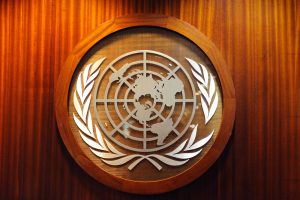After weeks of uncertainty and pressure, it turns out that no Afghan representative will address the United Nations’ General Debate, Reuters reports. Afghan Ambassador Ghulam Isaczai withdrew his name ahead of remarks scheduled for Monday’s session, the final day of the 2021 General Debate. He’s not alone in that silence while sitting in a coveted seat: Myanmar’s U.N. representative will also not speak.
Myanmar’s ambassador to the U.N., Kyaw Moe Tun was appointed by the civilian National League for Democracy (NLD) government, the leaders of which are now on trial. He took a strong stance against the February military coup, but will not speak in Myanmar’s Monday slot this year. Al Jazeera reported last week that Kyaw Moe Tun’s silence at the General Debate was the price of keeping the seat per an understanding between Russia, China, and the United States, all members of the U.N. credentials committee.
Afghanistan’s Isaczai, appointed the country’s permanent representative to the United Nations in June 2021 by then-President Ashraf Ghani, has been under pressure to yield the Afghan seat to the Taliban government now in power in Kabul.
The Taliban reportedly wrote to the United Nations requesting the ability to address the annual U.N. General Assembly. Per an Associated Press report on September 26, “[The Taliban] argue they have all the requirements needed for recognition of a government. The U.N. has effectively responded to the Taliban’s request by signaling: Not so fast.”
Late last week, Pakistan’s Foreign Minister Shah Mahmood Qureshi stopped short of calling for the Taliban to be seated in the General Assembly, but did tell the New York Times in an interview that Isaczai had no standing and the Afghanistan seat should be vacant.
As with Myanmar’s Kyaw Moe Tun, silence might be the price of Isaczai remaining in Afghanistan’s seat at the United Nations for now; especially in light of continued wrangling over whether, and how, to recognize the reality of Taliban rule in Afghanistan.
Nevertheless, a disconnect between the representatives of a country, and the powers in control of a country, is not a stable or practical long-term arrangement.
Afghanistan’s currently accredited ambassador to the U.N. in Geneva, Nasir Andisha, told the AP, “Taliban does not represent the will of the Afghan people.” He also suggested the international community use the fact that the Taliban want the U.N. seat but do not occupy it as leverage. “I think for the world, for the United Nations, it’s time to use this as a leverage,” he said.
The Taliban’s selected representative, Suhail Shaheen — who has been a negotiator and spokesman for the group — said that the Taliban’s government should be admitted to the U.N. as “all borders, territory and major cities of Afghanistan are in our control.”
“We have all the requirements needed for recognition of a government. So we hope the UN as a neutral World Body recognize the current government of Afghanistan,” he told the AP.
At least 14 members of the all-Taliban “interim” government in Kabul are on U.N. sanctions lists, including acting Prime Minister Mohammad Hasan Akhund and both of his deputies, Mullah Abdul Ghani Baradar and Mawlawi Abdul Salam Hanafi, as well as acting Defense Minister Mullah Yaqoub, acting Foreign Minister Mawlawi Amir Khan Muttaqi, and his deputy Sher Mohammad Abbas Stanikzai. Interior Minister Sirajuddin Haqqani is not only on U.N. sanctions lists, but the United States has offered a $10 million reward for information leading to his arrest.
This makes for extra murky waters when it comes to international recognition.
The U.N. charter simply says that the body “is open to all peace-loving States that accept the obligations contained in the United Nations Charter and, in the judgment of the Organization, are able to carry out these obligations.” There’s a formal process of application and approval, but is ultimately up to a vote. While we can list the simple attributes of a modern state — a population, a defined territory, a government — ultimately what it takes to be recognized as a state is recognition as a state by other states. While each state makes it own decisions as to which other states it recognizes, many will follow the lead of the world’s major powers. Capitals around the world will most closely track the United States and China in this regard.
For now, no one will speak for Afghanistan at the United Nations, though Afghanistan is certainly a topic of much conversation among the world’s diplomats.

































